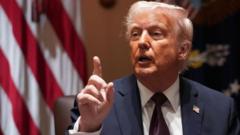This website uses cookies so that we can provide you with the best user experience possible. Cookie information is stored in your browser and performs functions such as recognising you when you return to our website and helping our team to understand which sections of the website you find most interesting and useful.


US President Donald Trump says he had an "extremely productive" first call with Canadian Prime Minister Mark Carney, amid an ongoing trade war between the two neighbours.
In a Truth Social post, Trump said that the two will meet "immediately" after Canada's upcoming elections on 28 April to discuss "politics, business, and all other factors".
Carney, currently in the midst of an election campaign, described the call as "very constructive", adding that he told the president that Canada "will implement retaliatory tariffs to protect Canadian workers".
Trump's planned 25% tariffs on vehicle imports is to come into effect on 2 April, which could be devastating for the Canadian car industry.
Historically, Canadian leaders prioritise an early call with their US counterpart soon after becoming prime minister.
The call between Carney and Trump, however, is the first since the new prime minister took office on 14 March.
The Canadian prime minister's office said the two leaders agreed to begin comprehensive negotiations about a new economic and security relationship immediately following the election.
"In the interim, the leaders agreed that conversations between the Minister of International Trade and Intergovernmental Affairs and President of the King's Privy Council for Canada, Dominic LeBlanc, and the United States Secretary of Commerce, Howard Lutnick, will intensify to address immediate concerns," the statement said.
The US president's tone on Friday stood in contrast to his past remarks about Canada, particularly his frequent jabs at Carney's predecessor, Justin Trudeau, whom he mockingly referred to as "Governor Trudeau".
"I've always loved Canada," Trump told reporters after the call. "We had a very good conversation. The prime minister - they've got an election going on, so we're going to meet after the election."
In addition to imposing tariffs, Trump has repeatedly suggested that Canada should become the 51st US state—an idea that has sparked widespread backlash among Canadians.
The US has already partially imposed a blanket 25% tariff on Canadian goods, along with a 25% duty on all aluminium and steel imports. Canada has so far retaliated with about C$60bn ($42bn; £32bn) of tariffs on US goods.
The new car tariffs will come into effect on 2 April, with charges on businesses importing vehicles starting the next day, the White House said. Taxes on parts are set to start in May or later.
On Thursday evening, Carney said the US was "no longer a reliable trading partner" and that Canada's old relationship with the US "is over".
Carney, who leads Canada's Liberal Party, has vowed to impose retaliatory tariffs with "maximum impact" on the US.
On Friday, he conveyed the message once again to Trump, according to the statement from his office, suggesting further counter tariffs could be announced if Trump moves ahead with threatened auto tariffs and other possible levies 2 April.
The US president's proposed auto tariffs could impact as many as 500,000 jobs in the Canadian auto industry.
"I think things will work out very well between Canada and the United States," Trump said to reporters after the call.
"We have liberation day, as you know, on April 2 and, I'm not referring to Canada, but many countries have taken advantage of us."
Worsening US-Canadian relations have become a key electoral issue in Canada's general election.
After the call, Pierre Poilievre, leader of the Conservatives, the main opposition party, asked about the apparent change in tone from Trump, said he "hopes" that is the case, adding "we want to put an end to this crazy tariff chaos".
He also lambasted the Liberals, who have been in power since 2015, saying: "It's clear the president would like to keep the Liberals in power - they've been very good for his agenda. He wants to take our money and our jobs and Liberals have helped him do it."
On the campaign trail on Friday, Bloc Québécois leader Yves-François Blanchet, whose party represents Quebec's interests in Ottawa, expressed concern that Carney's statement about a comprehensive discussion to come with Trump could mean the Liberal leader is open to conceding to US pressure.
Left-wing NDP leader Jagmeet Singh has previously referred to tariffs as a "betrayal".
Trump has also warned Canada against working with the European Union against US reciprocal tariffs that he is expected to announce soon.
Any effort to do so, he said, would be met with "large scale tariffs, far larger than currently planned".



 Africana55 Radio
Africana55 Radio 
